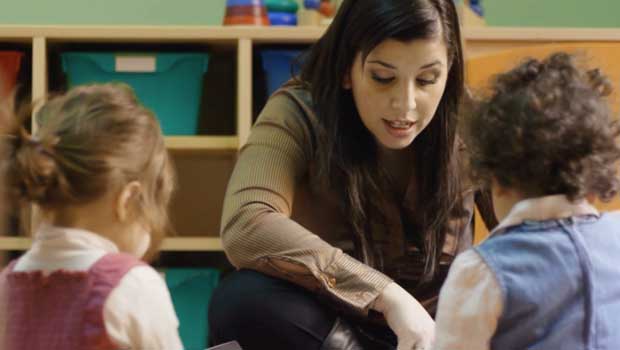5 Early Signs of Autism Often Missed by Pediatricians – Dr. Kat Lewitzke of Bright Pine Behavioral Health in Clarkston lists symptoms that are often missed when diagnosing autism spectrum disorders. She even offers a link to FREE online autism screening courtesy of Bright Pine (see below).
Autism Spectrum Disorder is a developmental disorder that affects communication, social skills, and behavior. While it can be diagnosed at any age, it is categorized as a “developmental disorder” because symptoms become most prominent in the first two years of life. Autism is classified as a spectrum due to the wide variation in the severity of symptoms. Furthermore, while autism is often classified as low, moderate, or high functioning, the prognosis varies from person to person.
Unfortunately, many of the common signs of autism are often missed by pediatricians. I see it becoming an increasing trend that many parents come to me with a child who is 3, 5, or even 9 years old; and despite expressing multiple developmental concerns to their pediatrician have yet to have an autism evaluation completed. What concerns me about this is that testing for autism can be carried out as young as 12 months, and research shows that early intervention is critical for treatment.
5 Early Signs of Autism Often Missed by Pediatricians
Early Signs of Autism Often Missed by Pediatricians – SPEECH
Delayed language is one of the first noted parent concerns. However, just because a child is speaking, or may even present as highly verbal, does not dismiss them from having autism. They may also appear obliviousness to others, which can sometimes be misinterpreted as defiance or disobedience. When in play groups they may be seen more as “wonderers” than truly engaged in the group activity, or cut in front of others on the playground without realizing there is a line. Children with autism may also struggle to respond to friendly social overtures; which are social engagements directed to another with the intention of reciprocal communication.
Early Signs of Autism Often Missed by Pediatricians – EYE CONTACT
Lack of eye contact or eye that is intermittent and inconsistent, is a key symptom of autism; but it is not indicative of a diagnosis. Many individuals can maintain eye contact and only exhibit minor impairments in non-verbal gesturing. When these are evident, autism may pediatricians may not readily push parents for autism testing. However, other things to look out for are difficulty responding to name, and the direction of the child’s gaze; are they looking at you, or is their gaze object oriented? For example, if you’re blowing bubbles and they want more, do they look at you when asking for more bubbles or are they solely fixated on the object?
Early Signs of Autism Often Missed by Pediatricians – DIFFICULTIES IDENTIFYING WITH EMOTIONS
Other things to look out aside from eye contact is flat affect and lack of smiling, especially directing a smile towards caregivers. Emotions may fluctuate from happy and laughing, to frustration and screaming in a matter of seconds. When reading or looking at a book with your child, observe the quality of their ability to identify emotions and facial expressions displayed in pictures.
Early Signs of Autism Often Missed by Pediatricians – DIFFICULTY INTERACTING WITH OTHERS
Many with autism struggle with interacting with others. This is something that can be evidenced as early as 12 months. Children may not readily respond to their name, even when it is a parent or caregiver attempting to get their attention. It is normal development for young toddlers to show parents and caregivers objects. This is often in the form of the child bring a toy to the parent and walking away. When a child is demonstrating “lack of showing,” does not bring you objects, or has difficulty with pointing at objects, it is advised that parents investigate further with a psychologist who specializes in treating young children; and who has training in autism and working with children as young as 12 or 18 months.
Early Signs of Autism Often Missed by Pediatricians – RESTRICTED INTERESTS AND REPETETIVE BEHAVIORS
Children may struggle with imaginative and pretend play. By the time children are two or three years old, most can play together with others and interact in an activity to achieve a goal. Children with autism struggle with this; often getting “stuck” in solitary play or engage in activities that lack meaning or purpose. They play differently, and the following are often observed
• A preference to be alone, despite encouragement and engagement from others.
• Difficulty understanding basic rules of play and turn taking; struggles with playing sports, or following a board game.
• Engaging in purposeless and repetitive activities (i.e., lining up objects, flicking light switch, slamming doors, lining up objects, etc.)
• Difficulty with imaginative and symbolic play (i.e., vague, struggles to role play).
Autism affects a person’s ability to function properly in school, work, and other areas of life. It is not a requirement for all these 5 symptoms to be present for a diagnosis of autism; and remember, these symptoms occur on a spectrum – meaning that in some individuals the intensity of the behaviors can be very subtle. Often, when mild, a diagnosis can be missed or inaccurate.
For additional information, please check out this FREE autism screener from Bright Pine Behavioral Health
Bright Pine Behavioral Health Clarkston
6060 Dixie Highway, Suite H
Clarkston, MI 48346
248-455-6619
www.brightpinepsychology.com
OAKLAND COUNTY MOMS HEALTH / SPECIAL NEEDS ARTICLES
For more info on the 5 Early Signs of Autism Often Missed by Pediatricians, call our friends at Bright Pine Behavioral Health at 248-455-6619 or visit www.brightpinepsychology.com


